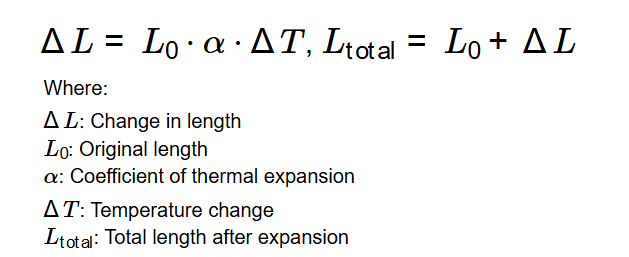Temperature to Length Calculator
Unit Converter ▲
Unit Converter ▼
1. What is the Thermal Expansion Calculator?
Definition: The Thermal Expansion Calculator determines the change in length and total length of a material due to a temperature change using the formula \(\Delta L = L_0 \cdot \alpha \cdot \Delta T\).
Purpose: Helps engineers predict dimensional changes in materials under thermal loads.
Reference:Applied Strength of Materials for Engineering Technology
http://www.etcs.pfw.edu/~dupenb/ET_200/Applied%20Str%20of%20Mat%20for%20ET%20v14%20July%202018.pdf
2. How Does the Calculator Work?
Formula:
\(\Delta L = L_0 \cdot \alpha \cdot \Delta T\), \(L_{\text{total}} = L_0 + \Delta L\)
Where:
- \(\Delta L\): Change in length
- \(L_0\): Original length
- \(\alpha\): Coefficient of thermal expansion
- \(\Delta T\): Temperature change
- \(L_{\text{total}}\): Total length after expansion
Steps:
- Step 1: Input Original Length. Enter the initial length (e.g., 100 mm).
- Step 2: Select or Input Coefficient of Thermal Expansion. Choose a material (e.g., Steel: 0.000012 /°C) or enter a custom value.
- Step 3: Input Temperatures. Enter initial and final temperatures (e.g., 20°C and 100°C).
- Step 4: Calculate. The calculator computes the change in length and total length.
3. Importance of Thermal Expansion Calculation
Calculating thermal expansion is crucial for:
- Material Design: Ensures components fit under temperature variations.
- Structural Integrity: Prevents stress from expansion or contraction.
- Unit Consistency: Supports conversions across metric and imperial units.
4. Using the Calculator
Example:
Length = 100 cm, Material = Aluminum (0.000023 /°C), Initial Temp = 20°C, Final Temp = 100°C:
- Step 1: \(\Delta T = 100 - 20 = 80 \, \text{°C}\).
- Step 2: \(\Delta L = 100 \cdot 0.000023 \cdot 80 = 0.184 \, \text{cm}\).
- Step 3: \(L_{\text{total}} = 100 + 0.184 = 100.184 \, \text{cm}\).
5. Frequently Asked Questions (FAQ)
Q: What is the coefficient of thermal expansion?
A: It’s the fractional change in length per degree of temperature change.
Q: Can I use Fahrenheit?
A: Yes, the calculator converts °F to °C internally.
Q: Is this accurate for all materials?
A: Yes, if \(\alpha\) is correctly input or selected for the material.
Thermal Expansion Calculator© - All Rights Reserved
 Home
Home
 Back
Back
